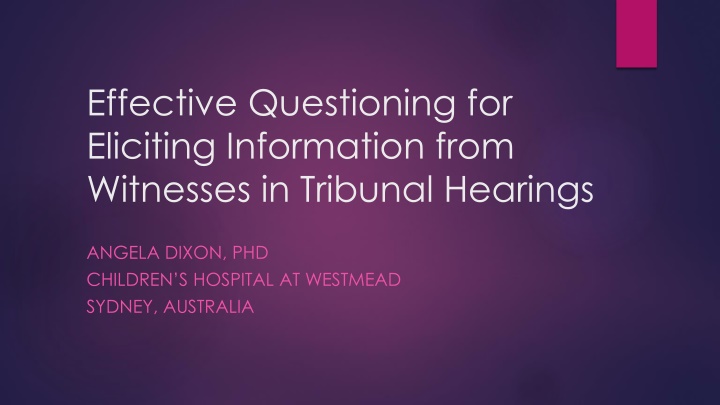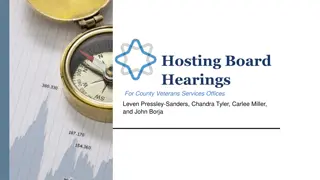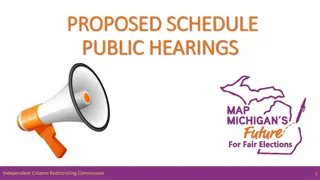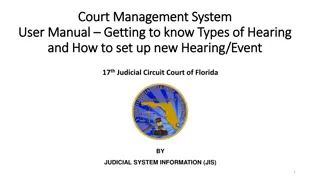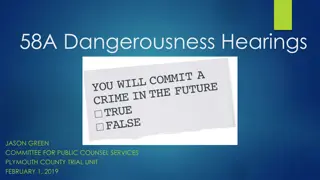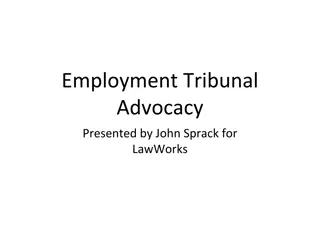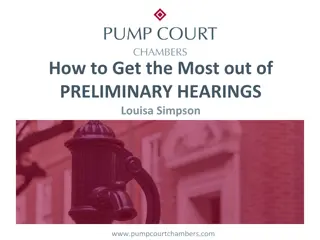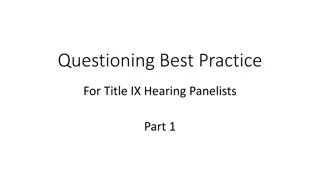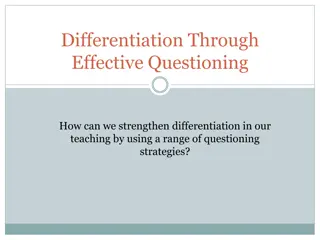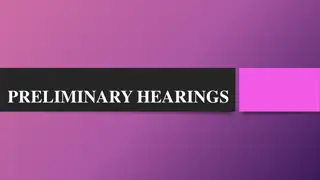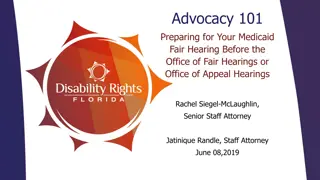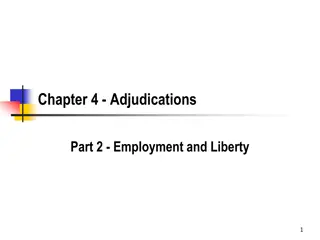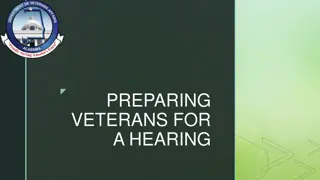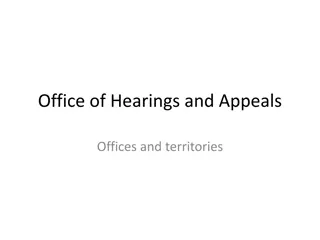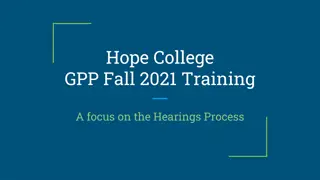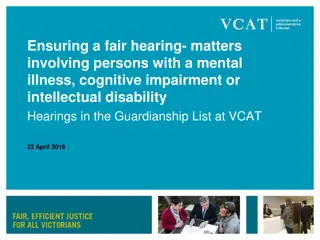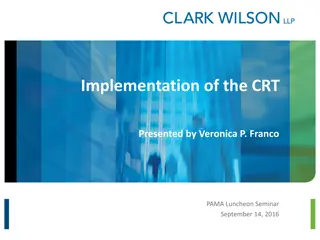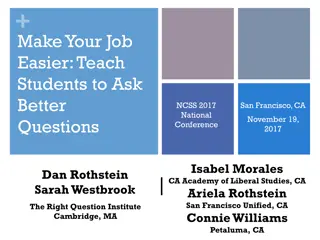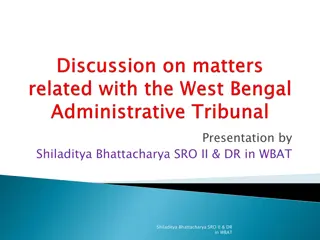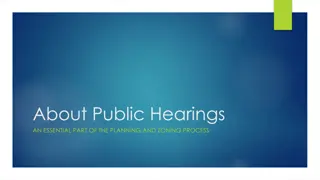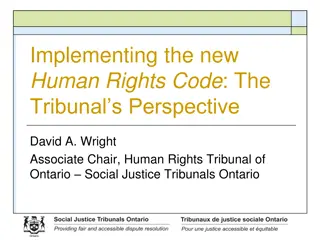Effective Questioning Techniques in Tribunal Hearings
Effective questioning techniques are crucial in tribunal hearings to elicit accurate information from witnesses. Angela Dixon, Ph.D., emphasizes the importance of asking the right questions to engage participants and achieve optimal outcomes. Communication barriers, competency areas, and strategies for promoting respectful dialogue are discussed, highlighting the key role of questions in gathering information and managing interactions effectively.
Download Presentation

Please find below an Image/Link to download the presentation.
The content on the website is provided AS IS for your information and personal use only. It may not be sold, licensed, or shared on other websites without obtaining consent from the author.If you encounter any issues during the download, it is possible that the publisher has removed the file from their server.
You are allowed to download the files provided on this website for personal or commercial use, subject to the condition that they are used lawfully. All files are the property of their respective owners.
The content on the website is provided AS IS for your information and personal use only. It may not be sold, licensed, or shared on other websites without obtaining consent from the author.
E N D
Presentation Transcript
Effective Questioning for Eliciting Information from Witnesses in Tribunal Hearings ANGELA DIXON, PHD CHILDREN S HOSPITAL AT WESTMEAD SYDNEY, AUSTRALIA
Judge a man by his questions rather than by his answers. Voltaire Pierre-Marc-Gaston, duc de Levis
A solution-focused approach why? Aims to engage participants in hearings as active partners in the discussion and decision-making process of a court and tribunal. Based on the premise that the best outcomes are achieved when participants are key players in the formulation and implementation of plans to address the underlying issues.
Communication Barriers to communication Current mental state Stress levels Personality factors Cultural differences
to participate effectively in tribunal hearings depends on their capacity at the time, as well as their understanding of the tribunal s function, their emotional state and the opportunity they are given to contribute Carney et al, 2011
Competency areas Forms of speech Body language Listening skills
Strategies to promote effective and respectful dialogue A judicial officer can use questions, statements, requests, single words or non-verbal prompts to promote dialogue with participants The key is how to frame questions and other responses to avoid anti- therapeutic effects (Kings Bench Book)
Use of questions Asking the right questions at the right time will help you gather better information, build stronger relations and manage people more effectively; it can also help to avoid misunderstandings and diffuse difficult situations. A skilled questioner will have a clear strategy and formulate questions in advance. Questions that lawyers ask in interviews with clients, for example, will nearly always be non-leading questions but a good lawyer will know when to use another style of question.
Use of questions There are some general guidelines that are always applicable: Ask only one question at a time Use simple words Use short questions Give the other person enough time to respond they may need some thinking time
Use of questions Leading questions Have limited use in hearings you have problems with your treatment team, don t you?
Closed questions usually receive a single word or very short, factual answer are good for: Testing your understanding, or the other person's: "So, if I get this qualification, I will get a raise?" Concluding a discussion or making a decision: "Now we know the facts, are we all agreed this is the right course of action?" Frame setting: "Are you happy with the service from your bank?"
Use of questions Open questions Are ideal Particularly WHAT and HOW questions How are you? What has been happening since your last hearing? How have you been coping? I see that you moved house recently. How is your new accommodation working out for you?
Open questions elicit longer answers are good for: Developing an open conversation: "What did you get up to on vacation?" Finding out more detail: "What else do we need to do to make this a success?" Finding out the other person's opinion or issues: "What do you think about those changes?"
Use of questions Avoid the why questions: Can be perceived as being a demand for explanation defensiveness Compare: why did you stop your medication? or why didn t you keep your appointment with your doctor With: I see that you stopped your medication/This report mentions that you missed an appointment with your doctor. What happened there?/How did that come about?
Asking questions about sensitive matters Explain what information you require Explain why you need the information Ask permission to ask the question Relate it directly to the legal issues if necessary.
Funnelling Tell me how you went about ? (open) How did you prepare? (open secondary) What was your starting point? (probe) So, what happened next? (probe) Who else was involved? (probe) And how did they respond? (probe) What were your thoughts at that stage? (probe) What were the main outcomes? (probe) So, that took a total of six weeks? (closed clarifying) Was it your idea or someone else s? (closed clarifying) And the patient made a full recovery? (closed clarifying) So, let me see if I ve followed you (checking summary)
The use of single words or phrases Can be an effective way of moving dialogue along: Participant: I used ice on Friday. It wasn t good. I ve been thinking about what I need to do Magistrate: What do you need to do? Participant: What I need to do is stop using
Making a statement To avoid sounding accusatory, try: I am not clear what brought about your relapse Rather than Why did you relapse?
Other solution-focused techniques Paraphrasing Using your own words to repeat back to someone else what they have said Can be used to Clarify what has been said Demonstrate you have listened Demonstrates you care about what the participant thinks and feels Help the participant clarify their thoughts and feelings
Paraphrasing I started hearing the voices again for a while. But they changed my medication and I feel better now? so, you re feeling better because you changed your medication, is that right?
Supporting Acknowledging and identifying with a person s situation through Expressing empathy, agreement, praise, reassurance Positive versus negative feedback I ve started working part-time and it s going well so far Well done. What type of work are you doing? On discharge from an order Congratulations. You deserve it!
Speech and language Avoid technical, legal and medical language Avoid qualifying positive statements with but It is great you stayed off drugs since your last appearance, but you missed an appointment with your counsellor.
What I try to do is to get some sense of the person Im talking to and how they would normally interact with other people and then work on those sorts of levels. We certainly are in an environment where there is lots of jargon around so trying to de-jargonise, particularly medical matters, is really important. Making sure people really do understand as best they can what s going on is important. And that varies enormously. ([former] Victorian MHRB President)
Speech and language Exercise caution in using you Problematic: How come you didn t attend appointments with your case manager last month? Better: I ve been told about some missed appointments with your case manager. What happened there? Use of we and humour Can promote a sense of collaboration Should not be used at the expense of participants
Practical listening skills Ways in which listening can be impaired Note-taking and reading files during the hearing strategies Non-verbal body language Eye contact Facial expressions
Blocking and interrupting Exercise caution
But they didnt seem to take very much notice of what I said. What made you think that? It was just their attitude. I wasn t very happy at all. I felt I wasn t allowed to talk. If I did talk it was just that they were just listening and that was all. They weren t hearing what you were saying? Is that what you mean? Yes. Was that something to do with their body language? It was just the way that he kept saying yes, yes, yes, yes to me. Sort of interrupting me when I was speaking. Yes we ve heard that before from the person who advocated for me. Yet they asked me to speak. (Victorian consumer, v17).
Blocking and interrupting Interrupt respectfully when necessary you ve made several points. I want to make sure I ve understood them Thank the person for talking about the particular topic, which is clearly important to them. Ask them to now focus on another important matter (a different topic). Be transparent about the limits of a hearing.
A final word Interpersonal communication varies according to the circumstances and the personalities, backgrounds and needs of the people involved. People may well vary in what they value in empathetic communication. It is therefore important that judicial officers be sensitive to the individual situation of the participant and what he [sic] is saying and to the uniqueness of the interaction between the bench and each participant. (The Bench Book, Dr Michael King, 2009)
References Effective questioning strategies and examples adapted from: Mental Health Tribunal (2014). A guide to solution-focused hearings in the Mental Health Tribunal. Available at: http://www.mht.vic.gov.au/wp-content/uploads/2014/07/Solution- focused-hearings-guide.pdf Carney, T., Tait, D., Perry, J., Alikki, V., & Beaupert, F., (2011). Australian Mental Health Tribunals: space for fairness, freedom, protection & treatment? Law and Justice Foundation of NSW, Adelaide. King, M. (2009) Solution-focused judging bench book. Australasian Institute of Judicial Administration Incorporated, Melbourne. NHS (2012) Skillful questioning and active listening e-learning module. Available at: https://faculty.londondeanery.ac.uk/e- learning/appraisal/skilful-questioning-and-active-listening
